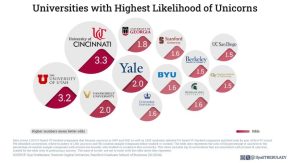
U News 1 | Finance Professor at Stanford ranks universities of potential to graduate unicorns
Georgia Tech receives award from the U.S. Department of Energy for the development of GridLogic, a device to protect the electric grid.
From Stanford University:
Ilya Strebulaev, a Finance Professor at the University, has determined that the University of Cincinnati (UC) is the most efficient “unicorn” farm in the United States. In fact, UC produces a higher ratio of unicorn company founders than the likes of Stanford, Vanderbilt or MIT – or, for that matter, any other school in the U.S.
The term unicorn refers to a privately held start-up company with a value of more than $1 billion.
Strebulaev founded the Venture Capital Initiative in Stanford’s Graduate School of Business in 2015 where academic researchers and practitioners meet over their shared passion about advancing research and teaching on innovation and venture capital.
 According to his latest research, founders of a U.S. start-up who studied or worked at UC are 3.3 times more likely to achieve unicorn status than the average founder. The next closest is the University of Utah at 3.2 followed by Vanderbilt and Yale at 2.0, and the University of Georgia at 1.8. Stanford is tied with several others at 1.6.
According to his latest research, founders of a U.S. start-up who studied or worked at UC are 3.3 times more likely to achieve unicorn status than the average founder. The next closest is the University of Utah at 3.2 followed by Vanderbilt and Yale at 2.0, and the University of Georgia at 1.8. Stanford is tied with several others at 1.6.
From the Georgia Institute of Technology:
The Georgia Tech Research Corporation has received an award from the U.S. Department of Energy (DOE) for the development of GridLogic, a framework for cyber-physical security of the electricity grid and distributed energy resources (DERs) that will impede cyber-attackers and even a malicious insider operator from taking actions that are detrimental to the electricity grid. It is one of 16 projects across six states that shared $45 million in funding designed to protect the nation’s energy sector from cyber attacks. Managed by DOE’s Office of Cybersecurity, Energy Security, and Emergency Response, the selected projects will help develop new cybersecurity tools and technologies designed to reduce cyber risks and strengthen the resilience of America’s energy systems, which include the power grid, electric utilities, pipelines, and renewable energy generation sources like wind or solar.
From Miami University:
For the eighth consecutive year, the John W. Altman Institute for Entrepreneurship’s venture capital investment team won a U.S. Regional Final in the Venture Capital Investment Competition (VCIC), and, for the eighth consecutive year, has earned a spot in the Global Finals.
The VCIC is an invitation-only, international competition with student venture capital teams from top business schools around the world. This year, venture teams from more than 100 universities around the world competed in 20 regional competitions – 12 focused on graduate students and eight for undergraduates.
In the VCIC, venture capital investment teams assume the identity of a venture firm. On the first day of the three-day competition, each student venture team receives a profile of the firm’s venture fund (size, age, investment stage, targeted industries/markets, number and size of previous investments, etc.) and business plans for three seed stage companies. Teams are given 36 hours to conduct due diligence on the companies, their founders, and the market and prepare a term sheet for an investment in one of the companies.
On the final day of the competition, teams evaluate pitches made by each company and participate in a one-on-one Q&A with the founder(s) after which teams have two hours to finalize their investment decision. Each team defends its investment recommendation to a panel of current venture capital investors who assess each team’s investment decision and logic and then negotiate final terms with the founders of the selected company.
From the University of Rhode Island:
The University has announced its inaugural “Innovation and Entrepreneurship Challenge” sponsored by 401 Tech Bridge, a division of the University of Rhode Island (URI) Research Foundation, and funded by RISE-UP. The new program invites URI students to contribute to the University’s 10-year strategic plan and joins a culture of cross-disciplinary entrepreneurship and innovation at the University.
Prizes for the challenges range from $250 to $2,000, with challenge offerings continuing to be updated. The program’s current challenges are:
- R&R – Repurpose and Redistribute. This challenge aims to reduce hard waste in the URI campus community by developing innovative ways to repurpose items and/or find new homes for them.
- Imagining Your Own Utopia: Green Rooftop Design. Students are invited to design plans for an environmentally friendly and aesthetically appealing rooftop terrace for Lippitt Hall.
- Improving Health Across the Lifespan. The College of Health Sciences seeks to develop innovative solutions to complex problems that promote physical and mental health and well-being, improving physical and mental health to enhance the quality of life for people of any age.
- Designs for All: Engineering Better Solutions for People with Disabilities. This challenge invites participants to address the unique challenges faced by people with disabilities in their daily lives, fostering creative solutions that make the world more accessible and equitable for everyone.
- Underwater Hotels for Robots. Students are invited to propose a design of a modular hotel for autonomous underwater robots in different sizes and shapes.
- The Impact Challenge. This challenge welcomes ideas and innovative approaches that can make an impact on social issues, technological interventions and sustainability.
- Catalyzing Change Through Arts and Sciences Collaborations. This category invites students to collaboratively address intersecting environmental and social challenges and help catalyze change by fusing the creative arts/humanities with the natural/social sciences.
- Biodesign Sustainability Challenge. This invites students to combine knowledge of biological systems with design thinking skills to address sustainability challenges.
- Textile Futures: Maximizing the Impact of Textile-Integrated Systems. This challenge seeks to engage Rhode Island’s academic community to develop innovative products, systems and solutions that will have a positive and lasting global impact by harnessing the potential of groundbreaking textile-integrated systems technologies.
Like what you've read?
Forward to a friend!

